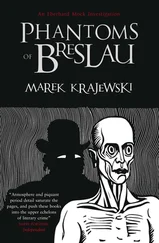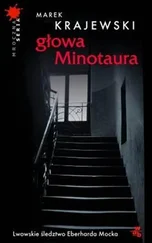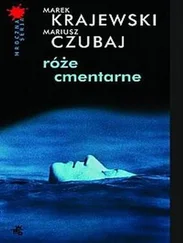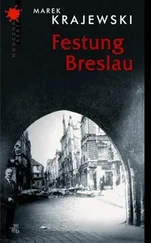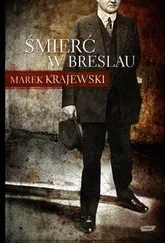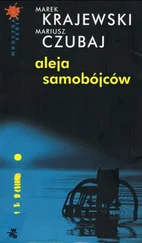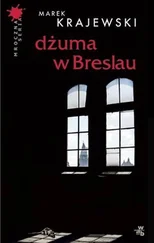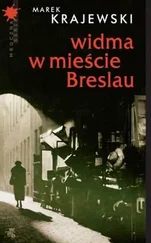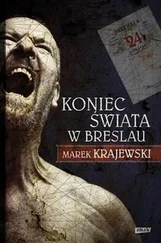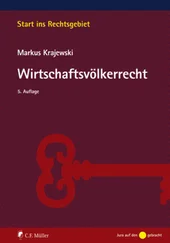Marek Krajewski - Death in Breslau
Здесь есть возможность читать онлайн «Marek Krajewski - Death in Breslau» весь текст электронной книги совершенно бесплатно (целиком полную версию без сокращений). В некоторых случаях можно слушать аудио, скачать через торрент в формате fb2 и присутствует краткое содержание. Жанр: Полицейский детектив, на английском языке. Описание произведения, (предисловие) а так же отзывы посетителей доступны на портале библиотеки ЛибКат.
- Название:Death in Breslau
- Автор:
- Жанр:
- Год:неизвестен
- ISBN:нет данных
- Рейтинг книги:3 / 5. Голосов: 1
-
Избранное:Добавить в избранное
- Отзывы:
-
Ваша оценка:
- 60
- 1
- 2
- 3
- 4
- 5
Death in Breslau: краткое содержание, описание и аннотация
Предлагаем к чтению аннотацию, описание, краткое содержание или предисловие (зависит от того, что написал сам автор книги «Death in Breslau»). Если вы не нашли необходимую информацию о книге — напишите в комментариях, мы постараемся отыскать её.
Death in Breslau — читать онлайн бесплатно полную книгу (весь текст) целиком
Ниже представлен текст книги, разбитый по страницам. Система сохранения места последней прочитанной страницы, позволяет с удобством читать онлайн бесплатно книгу «Death in Breslau», без необходимости каждый раз заново искать на чём Вы остановились. Поставьте закладку, и сможете в любой момент перейти на страницу, на которой закончили чтение.
Интервал:
Закладка:
Anwaldt felt immensely tired. In order to banish the tiredness, he shook the last cigarette from his packet. He inhaled and looked anew at Banaszak’s neat annotations. He did not understand anything because this was the page half-covered in Polish writing which Banaszak had not yet translated into German. Anwaldt examined the Polish text with fascination. He had always wondered about the mysterious diacritical marks: the flourishes beneath the “a” and “e”, the little wave over the “l”, the oblique accents over the “s”, “z” and “o”. Among these letters, he found his name written twice. This did not surprise him in the least, for in the arguments as to why the German police were to take over the investigation, Banaszak had often referred to its assignation. But the error in his name did surprise him. The name was written without a “t”. He leaned over the page so as to add a “t”, but withdrew his hand. A drop of ink flowed from the nib and splattered on the green felt which covered the table. Anwaldt could not pull his eyes away from his surname swimming among Polish squiggles, oblique lines and gentle waves. Only the surname was his. Not the first name: that sounded unfamiliar, foreign, proud: the Polish name “Mieczyslaw”.
He got up, opened the door and entered the main part of the station where, behind a wooden barrier, nodded a sleepy duty constable. His assistant, an old policeman just short of retirement, was arguing with some queen of the night in a flowery dress. Anwaldt walked up to him and discovered that the old man spoke German. Mentioning Police Officer Banaszak, he asked him if he would translate the Polish text. They went back to the interrogation room. The old policeman started stammering:
“According to Walenty Mikolajczak’s testimony … he carried Slusarczyk’s letters to the post office … He read and contemplated the name of the addressant … no … how do you say it?”
“Addressee. What does ‘contemplated’ mean?”
“Yes … addressee. ‘Contemplated’ means that he has it in his brain, he knows.”
“Addressee: Mieczyslaw Anwald, Poznan ul. Mickiewicza 2. Walenty Mikolajczak was surprised that she was sending letters addressed to a shop. The name of the establishment announces …”
“Reads, surely.”
“Yes. Reads. The name of the establishment reads ‘Mercer’s Goods. Mieczyslaw Anwald and Company’. Then is goes … well … I know … something about a photographic album … But what’s it to you? He’s asleep … sleeping …”
The old policeman abandoned his duties as translator with relief, went out of the room and left Anwaldt alone. Closing the door, he cast a concerned eye back at the tired German policeman who had rested his forehead on the coarse, green felt.
He was wrong. Anwaldt was not asleep at all. It was easier for him to transport himself in time and space with eyes closed. He was now sitting in Franz Huber’s agency with the old detective in his sights. In the agency, its walls covered in wood, floated specks of dust which settled as a powdered carpet on the thick files and glass panes behind which old photographs were turning yellow. Franz Huber was tapping the top of his desk with his engraved cigarette holder and slowly drawling out his words:
“Schlossarczyk worked for the Baron from 1901–1902. That’s presumably when she got pregnant. Thereafter, Baron Ruppert von der Malten, Olivier’s father, never again employed a woman, not even as cook. So her son must be thirty-one or thirty-two. His name? We don’t know. Certainly not the same as the Baron. His mother got a handsome sum to keep quiet, enough for her to live comfortably to this day. Where does the bastard live now? That we don’t know either. And what do we know? That until he became of age, he lived in an orphanage in Berlin, where he landed up as a baby from his loving mother’s arms.”
“What orphanage?”
“She doesn’t know herself. Some merchant took her there. An acquaintance of hers.”
“The merchant’s name?”
“She didn’t want to give it to us. She said he had nothing to do with it.” (I’m better than Schubert, the detective from Huber’s agency. I know what that merchant was called. The same as me except without a “t”. An orphanage in Berlin and a mercer from Poznan, Mieczyslaw Anwald. Two cities, two people, one surname, one death sentence.)
POZNAN, THAT SAME JULY 17TH, 1934
SEVEN O’CLOCK IN THE MORNING
The establishment of Mieczyslaw Anwald’s blue textiles on Ulica Polnocna near the Goods Station was already rumbling with life at this hour. Workers were carrying bales of material, carts and delivery vans were driving up to the ramp, a Jew was pushing a trolley constructed out of planks nailed together, the trade representative of the Bielschowsky establishment was waving his business card in front of the manager’s nose, abacuses were clattering in the counting-room, Police Officer Banaszak was puffing away at a small ivory pipe and Anwaldt was repeating in his mind: “it’s a pure coincidence that Schlossarczyk’s and Baron von der Malten’s son was brought up in a Berlin orphanage as I was, it’s pure coincidence that he was taken there by a man with the same surname as mine, I’m not the Baron’s son, it’s pure coincidence that Schlossarczyk’s and the Baron’s son was brought up …”
“Can I help you?” the well-built fifty-year-old squeezed a fat cigar between his fingers. “What do our dear police want from me?”
Banaszak got up and, with reluctance, glanced at the unshaven Anwaldt who was muttering something to himself. He pulled out his identification and, stifling a yawn, said:
“Police Officer Banaszak, and this is Criminal Assistant Klaus Uberweg from the Breslau Police. Did you know Hanna Slusarczyk of Rawicz?”
“No … no, I don’t … where …” the merchant glanced at the cashier women who were suddenly counting more slowly. “Let’s go to my apartment. It’s too noisy here.”
The apartment was large and comfortable. From the agency, the way in was through the kitchen door. Two servants threw a flirtatious eye at the young man for whom the night had been too short; under their employer’s glaring eyes, they immediately reverted to their plucking of a fat duck. The men’s footsteps rang on the sandstone floor. The merchant invited the policemen into the library where the spines of untouched books glittered and the green armchairs standing under a palm spread their soft insides. Through the open window wafted the nauseating, sweetish smell of a slaughterhouse. Mieczyslaw Anwald did not wait for Banaszak to repeat his question.
“Yes, I know Hanna Slusarczyk.”
“Do you speak German?” the police officer’s pipe was blocked.
“Yes.”
“Perhaps we could switch to that language. It will save us time since Assistant Uberweg doesn’t speak Polish.”
“Certainly.”
Banaszak finally blew his pipe through and the library filled with scented smoke.
“Let’s be exact, Herr Anwald. You knew her. Yesterday morning your friend was killed.”
Mieczyslaw Anwald’s face contorted in pain. There was no verbal reaction. Anwaldt ceased to repeat his mantra and started to ask questions:
“Herr Anwald, is it you who took Hanne Schlossarczyk’s illegitimate child to the Berlin orphanage?”
The merchant did not reply. Banaszak moved uneasily and said in Polish:
“My dear fellow, if you want your family to find out about your romance with a woman of ill repute, if you want to walk out of your establishment led to the police station by two uniformed policemen, then persist in your silence.”
The host looked at the unshaven man with flaming eyes, and answered in German with a Silesian accent:
Читать дальшеИнтервал:
Закладка:
Похожие книги на «Death in Breslau»
Представляем Вашему вниманию похожие книги на «Death in Breslau» списком для выбора. Мы отобрали схожую по названию и смыслу литературу в надежде предоставить читателям больше вариантов отыскать новые, интересные, ещё непрочитанные произведения.
Обсуждение, отзывы о книге «Death in Breslau» и просто собственные мнения читателей. Оставьте ваши комментарии, напишите, что Вы думаете о произведении, его смысле или главных героях. Укажите что конкретно понравилось, а что нет, и почему Вы так считаете.

